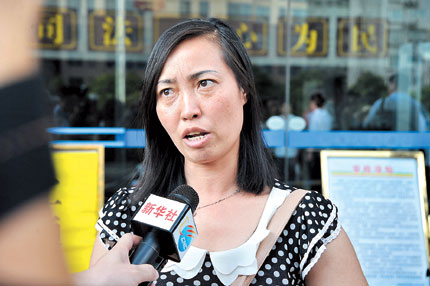'Secret' deal rejected by labor camp mother
 0 Comment(s)
0 Comment(s) Print
Print E-mail Shanghai Daily, July 3, 2013
E-mail Shanghai Daily, July 3, 2013
A mother put in a labor camp for demanding justice after the rape of her daughter received an apology from the camp administration chief at a court hearing in the central Chinese city of Changsha yesterday.
 |
|
Tang Hui is interviewed outside the Hunan Provincial Higher People's Court in Changsha, capital of Hunan Province, yesterday. |
But the court heard she had rejected an out of court settlement because of a condition that it be kept secret.
Tang Hui, 40, said Jiang Jianxiang told the court he "had not taken into account humanitarian care and sent me to labor camp, which was not appropriate ... so he gave an apology."
But she added: "Whether or not he says such things, it makes no difference."
Jiang, also the head of Yongzhou's police department and vice mayor, said in court that "inappropriate doesn't mean illegal," she told AFP.
The court heard that Tang had rejected an out of court settlement from the Yongzhou re-education through labor commission.
It was said to have been offered out of "humane" considerations rather than as an admission of guilt, the Legal Evening News reported.
Tang, who had petitioned for harsher punishments for those found guilty of raping her daughter and forcing her into prostitution, was demanding that a judgment in April by Yongzhou's Intermediate People's Court be overturned.
It had denied her request for an apology from the commission and compensation of 2,463 yuan (US$401) for the time she spent in the camp.
The Hunan Provincial Higher People's Court heard yesterday that though the commission rejected Tang's demands in public, it had tried to settle the case out of court by offering Tang the compensation she sought and an additional 100,000 yuan. However, Tang had been asked to keep the settlement confidential, the newspaper reported.
"I cannot accept the money in the dark. If you do it out of good will, you should make it public," she is said to have told a commission official sent to talk to her about the deal.
At yesterday's hearing, the commission admitted it had made the offer but said it had offered the money as "living subsidies out of humane care."
Xu Liping, Tang's lawyer, said the hearing was focused on whether the decision to put Tang into a labor camp was legal. The Yongzhou commission insisted its decision had been based on clear facts and conclusive evidence.
Xu called the commission "arrogant and insincere," the Beijing Times newspaper reported.
The hearing ended without a verdict being reached. If the court upholds the April judgment, Tang won't be making a further appeal, Xu said.
In October 2006, Tang's then 11-year-old daughter was kidnapped, raped and forced into prostitution. She was rescued on December 30, 2006.
She was found to have contracted sexually transmitted diseases during the period. She is studying at a senior high school near the home of a relative with whom she stays during school days.
The girl never speaks to boys in her class and her academic performance is said to vary radically, depending on her emotions.
After the Yongzhou Intermediate People's Court convicted the suspects in June 2008, Tang thought that prison terms for two of the attackers were too lenient and appealed. She began a hunger strike outside the court.
On June 5, 2012, the Hunan Provincial Higher People's Court sentenced two of the men to death and sentenced another four to life imprisonment. Another man received a 15-year prison term.
Tang was put in the labor camp in Yongzhou for "seriously disturbing social order and exerting a negative impact on society" after protesting in front of local government buildings on August 2, 2012.
She was sentenced to 18 months in the camp, but released after just eight days following a public outcry.






Go to Forum >>0 Comment(s)